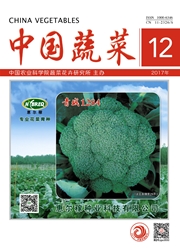

 中文摘要:
中文摘要:
The combination of 1,3-dichloropropene+dimethyl disulfide(1,3-D+DMDS), which forms a pre-plant soil fumigant, can provide a substitute for the environmentally unfriendly methyl bromide(MB). Three greenhouse trials were performed to evaluate the root-knot nematode and soilborne fungi control efficacy in the suburbs of Beijing in China in 2010-2014. Randomized blocks with three replicates were designed in each trial. The combination of 1,3-D+DMDS(10+30 g m-2) significantly controlled Meloidogyne incognita, effectively suppressed the infestation of Fusarium oxysporum and Phytophthora spp., and successfully provided high commercial fruit yields(equal to MB but higher than 1,3-D or DMDS). The fumigant soil treatments were significantly better than the untreated controls. These results indicate that 1,3-D+DMDS soil treatments can be applied by soil injection or chemigation as a promising MB alternative against soilborne pests in cucumber in China.
 英文摘要:
英文摘要:
The combination of 1,3-dichloropropene+dimethyl disulfide (1,3-D+DMDS), which forms a pre-plant soil fumigant, can provide a substitute for the environmentally unfriendly methyl bromide (MB). Three greenhouse trials were performed to evaluate the root-knot nematode and soilborne fungi control efficacy in the suburbs of Beijing in China in 2010-2014. Randomized blocks with three replicates were designed in each trial. The combination of 1,3-D+DMDS (10+30 g m-2) significantly controlled Meloidogyne incognita, effectively suppressed the infestation of Fusarium oxysporum and Phytophthora spp., and successfully provided high commercial fruit yields (equal to MB but higher than 1,3-D or DMDS). The fumigant soil treatments were significantly better than the untreated controls. These results indicate that 1,3-D+DMDS soil treatments can be applied by soil injection or chemigation as a promising MB alternative against soilborne pests in cucumber in China.
 同期刊论文项目
同期刊论文项目
 同项目期刊论文
同项目期刊论文
 期刊信息
期刊信息
